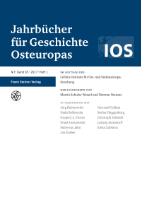
JAHRBUCHER FUR GESCHICHTE OSTEUROPAS
Scope & Guideline
Illuminating the Past: Insights into Eastern Europe's Complex Narratives
Introduction
Aims and Scopes
- Interdisciplinary Historical Research:
The journal emphasizes interdisciplinary approaches to history, drawing from fields such as sociology, cultural studies, and political science to provide a nuanced understanding of Eastern European histories. - Focus on Minority and Ethnic Studies:
A consistent focus on minority and ethnic studies is evident, exploring the experiences and narratives of various ethnic groups in Eastern Europe, including Jews, Roma, and others, highlighting their historical significance and contemporary implications. - Political History and Memory Studies:
The journal frequently addresses themes of political history, particularly regarding the impact of totalitarian regimes, national identity, and the politics of memory, providing critical insights into how history shapes contemporary political landscapes. - Cultural and Social History:
Cultural and social history remains a core area, with articles examining the cultural dynamics, artistic expressions, and social movements within Eastern Europe, reflecting the region's rich and diverse heritage. - Transnational and Global Perspectives:
The journal also promotes transnational and global perspectives on Eastern European history, analyzing how local histories intersect with broader global trends, including migration, imperialism, and globalization.
Trending and Emerging
- Impact of Recent Conflicts:
The ongoing war in Ukraine and its implications have become a significant theme, with numerous articles analyzing the historical context, consequences, and narratives surrounding the conflict, highlighting the relevance of history in contemporary geopolitics. - Cultural Memory and Identity:
There is a growing emphasis on cultural memory and identity, particularly in the context of post-Soviet societies. Scholars are increasingly examining how historical narratives shape collective identities and influence contemporary cultural practices. - Environmental History:
Emerging interest in environmental history is evident, with studies exploring the interplay between human societies and their environments in Eastern Europe, addressing issues of sustainability, ecology, and historical legacies. - Migration and Diaspora Studies:
Research on migration and diasporas is trending, reflecting the complexities of identity, belonging, and transnationalism in Eastern European contexts, particularly in light of recent global migration trends. - Post-Socialist Transformations:
The journal has seen an increase in studies focusing on post-socialist transformations, investigating the socio-political and economic changes in Eastern Europe following the collapse of communism, and their ongoing implications.
Declining or Waning
- Traditional National Histories:
There seems to be a waning interest in traditional national histories that focus solely on individual nation-states. Instead, there is a growing preference for transnational and comparative studies that offer broader perspectives. - Purely Military History:
The focus on purely military history has diminished, suggesting a shift towards more comprehensive analyses that incorporate social, cultural, and political dimensions of historical events. - Studies on Early Modern Period:
Research specifically centered on the early modern period appears to be less frequent, possibly overshadowed by contemporary historical issues and the urgent relevance of modern conflicts and transitions. - Limited Exploration of Rural Histories:
There is a noticeable reduction in studies focusing on rural histories and agrarian societies, indicating a possible shift towards urban-centric narratives and issues related to industrialization.
Similar Journals
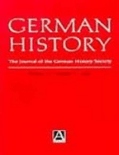
German History
Advancing Scholarship in German Historical StudiesGerman History is a leading academic journal published by Oxford University Press, focusing on the rich and multifaceted history of Germany from the medieval period to contemporary times. With a strong emphasis on interdisciplinary approaches, this journal invites contributions that explore social, cultural, political, and economic aspects of German history. Established in 1984, and with comprehensive publication coverage from 1984 to 1994 and from 1996 to 2024, German History occupies a significant place in the historical field, currently ranked in the Q2 category as per the 2023 Scopus rankings. Although it does not offer open access options, the journal continues to uphold academic rigor and scholarly excellence, making it a crucial resource for researchers, professionals, and students engaged in the study of German history. With a commitment to fostering high-quality research and dialogue, German History remains an essential platform for critical discourse and groundbreaking scholarship in the field.

SLAVONIC AND EAST EUROPEAN REVIEW
Pioneering Critical Analyses of Slavic HeritageSLAVONIC AND EAST EUROPEAN REVIEW, published by the Modern Humanities Research Association, stands as a pivotal academic journal since its inception in 1971, focusing on the rich cultural, historical, and linguistic landscapes of Eastern Europe and the Slavic-speaking world. With its ISSN 0037-6795 and E-ISSN 2222-4327, this esteemed journal provides a platform for scholars to share innovative research and critical analyses that shape the understanding of these complex regions. Although not open access, it maintains a reputation for rigorous scholarship, reflected in its categorization across multiple fields including Cultural Studies, History, and Literature in prestigious quartiles. The journal's Scopus rankings further illustrate its importance in the academic community, fostering a dialogue among researchers, professionals, and students who seek to deepen their insights into Eastern European studies. As a contributor or reader, you will find the SLAVONIC AND EAST EUROPEAN REVIEW an essential resource in navigating the intricate narratives that define this significant area of scholarship.
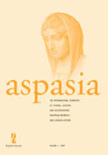
Aspasia
Charting new territories in gender and historical research.Aspasia is a distinguished open-access journal dedicated to the fields of Gender Studies and History, published by BERGHAHN JOURNALS and based in the United Kingdom. Since its inaugural issue in 2011 and achieving open access in 2019, Aspasia has committed to providing a platform that explores diverse scholarly perspectives on women's experiences and gender dynamics within historical contexts. With an impact factor reflective of its rigorous peer-review process, Aspasia has achieved notable rankings, including Q4 in Gender Studies and Q3 in History for 2023, indicating its growing influence within these disciplines. The journal is indexed in prominent databases, showcasing its relevance and contribution to ongoing academic discourse. Researchers, professionals, and students are encouraged to explore its rich content, fostering critical dialogue and advancing knowledge in the understanding of gender and historical narratives.
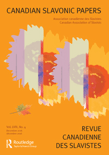
Canadian Slavonic Papers
Bridging Disciplines in the Heart of Slavic ScholarshipCanadian Slavonic Papers, published by Routledge Journals, Taylor & Francis Ltd, is an esteemed peer-reviewed journal dedicated to the exploration of the Slavic, Eastern European, and Russian domains, fostering scholarly dialogue across multiple disciplines. With a robust focus on Cultural Studies, History, Linguistics, and Literature, this journal has firmly established its presence in the academic community, as evidenced by its Q1 ranking across various categories in 2023. Since its inception, Canadian Slavonic Papers has been a vital platform for researchers, professionals, and students alike, providing an invaluable repository of knowledge and insights from 1977 to the present. While not an open-access journal, it remains accessible through institutional subscriptions, ensuring a wide dissemination of scholarship. Located in the United Kingdom, the journal continues to contribute significantly to the understanding of Slavic studies within a global context, making it essential reading for anyone invested in this dynamic field.
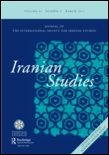
Iranian Studies
Pioneering Research in the Heart of Iranian HumanitiesIranian Studies is a prestigious academic journal published by Cambridge University Press, focusing on the intricate and diverse aspects of Iranian culture, history, and literature. With an impressive impact factor reflected in its Q1 and Q2 quartile rankings across several categories, including Literature and Literary Theory, History, and Cultural Studies, the journal stands as a vital resource for scholars dedicated to advancing their understanding of Iranian studies. Since its inception in 1967, it has provided a platform for rigorous research and critical discourse, making significant contributions to the fields of Iranian cultural and historical studies. Although the journal is not open access, it ensures quality and rigor in academic publishing, appealing to a wide array of readers, including researchers, professionals, and students seeking authoritative insights. With coverage available until 2024, Iranian Studies remains an essential point of reference and a source of innovative scholarship in the humanities.
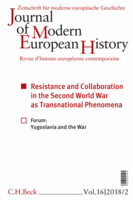
Journal of Modern European History
Advancing Knowledge Through Historical InsightsThe Journal of Modern European History, published by SAGE PUBLICATIONS LTD, is an essential resource for scholars and practitioners in the field of history, particularly focusing on modern European developments. With an ISSN of 1611-8944 and E-ISSN of 2631-9764, this journal boasts a reputation as a Q2 journal in the Arts and Humanities - History category, ranking in the top 25% of its field with a Scopus rank of #404 out of 1760 publications. With its converged years spanning from 2010 to 2024, this journal aims to provide cutting-edge research articles that deepen the understanding of modern European historical events, themes, and methodologies. As a pivotal platform for scholarly discourse, it supports vibrant academic exchange while offering avenues for researchers, professionals, and students to engage with innovative thought in the history domain. For those seeking to expand their knowledge or contribute to the field, the Journal of Modern European History serves as a vital tool for both insight and inspiration.

Pamiec i Sprawiedliwosc
Preserving History, Inspiring DialoguePamiec i Sprawiedliwosc is a pivotal academic journal published by the Instytut Pamięci Narodowej, Biuro Edukacji Publicznej, focused on the fields of history, memory studies, and social justice. This journal, identifiable by its ISSN 1427-7476, aims to facilitate the exploration and discourse on the interplay between memory and justice in the context of Polish history and beyond. With an emphasis on fostering scholarly dialogue, it serves as an essential platform for researchers, professionals, and students interested in understanding the historical narratives and collective memories that shape societal values. Although it is currently not an open-access journal, it commits to disseminating valuable research findings and theoretical discussions that resonate with contemporary issues within the domain of memory and justice. As a contributing voice in this field, Pamiec i Sprawiedliwosc not only preserves historical insight but also inspires ongoing educational debates crucial for a reflective society.
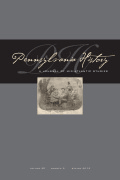
Pennsylvania History-A Journal of Mid-Atlantic Studies
Chronicling the Evolution of the Mid-Atlantic RegionPennsylvania History: A Journal of Mid-Atlantic Studies is a prestigious academic journal published by Penn State University Press, dedicated to advancing the scholarship of historical studies in the Mid-Atlantic region of the United States. With an ISSN of 0031-4528 and an E-ISSN of 2153-2109, this journal has been a vital resource since its inception, providing critical insights into the cultural, social, and political landscapes of Pennsylvania and its neighboring states. Ranking in the Q2 category of the 2023 history quartiles, it plays an essential role in fostering dialogue among historians, researchers, and students alike, attempting to elevate the discussion surrounding Mid-Atlantic history. Notable for its consistent publication across multiple decades—specifically from 1971 and its converged years—it has established a legacy of scholarly excellence. While access options remain non-open, the journal curates comprehensive scholarly articles and contemporary research that collectively situate Pennsylvania within the broader narratives of American history. Engage with the robust academic contributions of Pennsylvania History to explore rich historical themes and narratives that shape our understanding of the Mid-Atlantic region.

Lithuanian Historical Studies
Decoding the Cultural and Historical Fabric of LithuaniaLithuanian Historical Studies is a respected academic journal published by BRILL, focusing on the nuanced exploration of cultural, historical, and sociopolitical dynamics within Lithuania and its historical context. With an ISSN of 1392-2343 and an E-ISSN of 2538-6565, this journal aims to disseminate scholarly research that contributes to the understanding of Lithuania's cultural heritage and historical developments. Although it operates without an open-access model, its content is essential for researchers, professionals, and students interested in History, Cultural Studies, and Religious Studies. Ranked in the fourth quartile across several categories in 2023, including Cultural Studies and Sociology and Political Science, it provides a platform for academic discourse among those researching in the field. Despite its modest Scopus rankings, it plays a critical role in advancing knowledge within these disciplines and fostering dialogue across them, making it a valuable resource for anyone engaged in the study of Lithuanian or broader Eastern European history.

BULGARIAN HISTORICAL REVIEW-REVUE BULGARE D HISTOIRE
Preserving Insights: A Critical Look at Bulgaria's HistoryBULGARIAN HISTORICAL REVIEW - REVUE BULGARE D HISTOIRE is a distinguished journal published by the PUBL HOUSE BULGARIAN ACAD SCI, providing a critical platform for the exploration and analysis of historical narratives pertinent to Bulgaria and its broader regional context. With an ISSN of 0204-8906, this journal has been a reservoir of scholarly research since its inaugural issue, recently covering years from 2001 to 2007 and again from 2009 to 2023. Despite its classification in the Q4 category of History, it uniquely contributes to understanding and preserving historical insights, as reflected in its modest but growing impact in the academic community, where it currently ranks #1405 out of 1760 in Scopus Analytics. The journal aims to engage researchers, professionals, and students by presenting a diverse array of articles, encouraging scholarly discourse that sheds light on historical complexities and advancements. While it currently does not adopt an open-access model, it remains a crucial resource for those engaged in historical studies, particularly in Eastern European contexts.